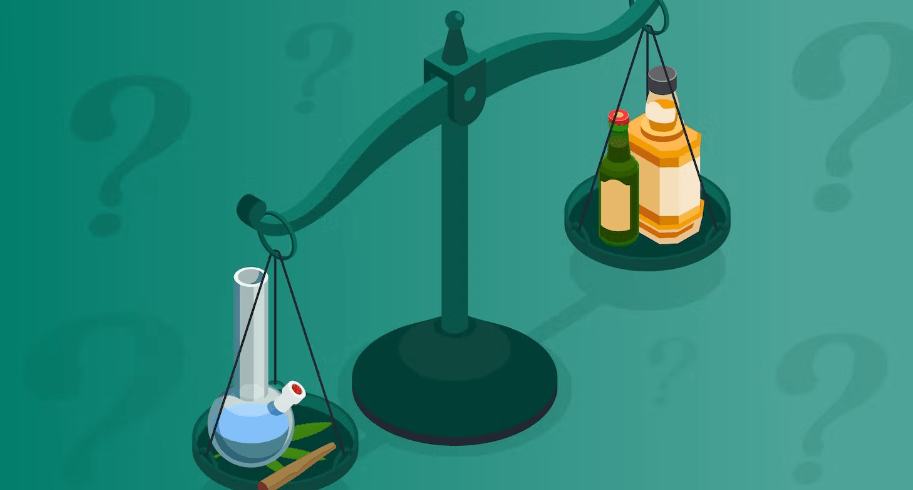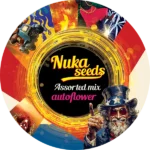English

There is a general perception that cannabis is safer and less addictive than alcohol. In a recent survey of more than 1,000 Americans, for example, respondents rated alcohol as “somewhat and moderately addictive”, while marijuana was rated as “not very or somewhat addictive”.
In addition, survey participants who do not use cannabis generally considered alcohol to be “moderately dangerous”, while they rated cannabis as “not very dangerous to somewhat dangerous”.
However, apart from the general views, is there any evidence that one substance is more addictive or harmful than the other?
What are the similarities between cannabis and alcohol?
Alcohol and cannabis have a number of properties in common. Both can help people relax, calm the nerves and relax the muscles. These effects occur because both alcohol and cannabis belong to the class of depressants (although cannabis also falls into several other drug categories).
Depressants increase the activity of GABA neurotransmitters in the brain. When GABA activity increases, the activity of the central nervous system slows down and the speed at which messages are transmitted between the body and brain also decreases. Think of GABA as a brake pedal for the brain: When this brake is applied, a calming effect occurs.
However, there is such a thing as too much of a good thing. Too much sedative means too much GABA activity, which in turn can lead to drowsiness, slow reactions, poor coordination and lack of concentration. Anyone who has ever had a little too much cannabis or alcohol can probably attest to slurred speech, premature fainting, perhaps stumbling and the like.
What is the difference between cannabis and alcohol?
For Dr Jordan Tishler, President of the Association of Cannabinoid Specialists and CEO/CMO of inhaleMD, cannabis differs from alcohol in several key ways.
“Alcohol is a very simple, single molecule that is a product of yeast fermentation,” Tishler said. “Basically, it’s yeast poop. Poop is generally a poison, and people have found that in small doses they like the effect of that poison on their brain. It’s really not good for you and currently has no medicinal benefit.
Cannabis, on the other hand, is a plant that contains hundreds of different compounds, many of which are therapeutically useful.
“We’ve just scratched the surface of what these compounds are and what they do,” Tishler explains. “However, it has been proven that THC and cannabis in general can be used to treat pain, anxiety, insomnia, nausea and vomiting, as well as other conditions.
Simply put, cannabis has medical applications, alcohol does not.
Is smoking cannabis addictive?
For Dr Jordan Tishler, President of the Association of Cannabinoid Specialists and CEO/CMO of inhaleMD, cannabis differs from alcohol in several key ways.
“Alcohol is a very simple, single molecule that is a product of yeast fermentation,” Tishler said. “Basically, it’s yeast poop. Poop is generally a poison, and people have found that in small doses they like the effect of that poison on their brain. It’s really not good for you and currently has no medicinal benefit.
Cannabis, on the other hand, is a plant that contains hundreds of different compounds, many of which are therapeutically useful.
“We’ve just scratched the surface of what these compounds are and what they do,” Tishler explains. “However, it has been proven that THC and cannabis in general can be used to treat pain, anxiety, insomnia, nausea and vomiting, as well as other conditions.
Simply put, cannabis has medicinal uses, alcohol does not.
Is cannabis addictive ?
Tishler stresses that understanding addiction is nuanced and that it can be helpful to distinguish addiction from dependence.
“Addictive is a complicated word,” says Tishler. “Addiction is a set of misbehaviours, while dependence is a physiological state that leads to withdrawal and often continued use of a substance.”
Tishler believes that dependence on cannabis is far more common than addiction, which is formally diagnosed as a cannabis use disorder. “Cannabis can lead to a dependence rate of about 7% – less than half the rate of alcohol – and a dependence rate that is very low but not defined,” Tishler explained.
We know from research that THC appears to be responsible for the addictive potential of cannabis because of its effects on the brain’s dopamine system. Dopamine is a neurotransmitter produced by the brain that influences the experience of pleasure and reward.
THC increases dopamine release, and when dopamine is released, the resulting feelings of happiness can enhance the potentially addictive effects of the cannabinoid. However, long-term heavy cannabis use can dull the body’s dopamine system. If the dopamine level remains elevated for too long, e.g. through constant cannabis use, a dysfunction of the dopamine system occurs.
The reward circuits in the brain can become impaired and it is harder to feel pleasure from things that are normally enjoyed, such as delicious food, a sense of achievement or physical touch. This lack of enjoyment can lead to even more chronic use to experience the rush that once came so easily.
CBD, on the other hand, does not appear to be addictive. Instead, there is evidence that this non-intoxicating cannabinoid can treat addiction. For example, a 2015 study found that CBD can be helpful in treating opioid, cocaine, tobacco and even cannabis addiction.
It is important to remember that the “addictive potential” of cannabis is more than just a chemical reaction in the brain – social and environmental factors also play a role. For example, certain populations seem more likely to become addicted to cannabis than others, possibly adolescents and people with another substance use disorder or a mood or mental illness such as schizophrenia.
In addition, other factors such as lifestyle, living and working environment and socio-economic status can have an additional influence on whether or not a person finds cannabis addictive.
How high is the addictive potential of alcohol?
Similar to cannabis, dependence on alcohol is more common than addiction, says Tishler.
“With alcohol, we see both dependence and addiction. The dependence rate is about 15%, and the addiction rate is much lower,” he said. “In higher doses, alcohol can be addictive and has harmful effects on the brain, heart, liver, blood and bone marrow.”
Recent studies also point to the various ways people can develop an unhealthy relationship with alcohol. For example, 29.7% of men and 22.2% of women aged 18 and over have engaged in binge drinking in 2019. Binge drinking, while not synonymous with alcohol dependence, is a form of abuse that contributes to the risk of developing an alcohol disorder.
These statistics certainly suggest that alcohol is more addictive or prone to abuse than cannabis, but why?
While there is no clear answer, there are several factors worth investigating. Like cannabis, alcohol stimulates the release of dopamine. However, alcohol has another neurochemical pathway through which it can become addictive – endorphins.
In a 2012 study, researchers at the University of California found that alcohol triggers the release of endorphins in two areas of the brain associated with reward processing. Endorphins are naturally occurring opioids in the body that relieve pain, make you feel good and induce a high. The study also found that heavy drinkers experienced a higher release of these feel-good chemicals, which exacerbates the addictive properties of alcohol.
Similar to cannabis, there are a number of variables that make some people more likely to become addicted to alcohol than others. Factors such as genetics, alcoholism in the family, mental disorders such as depression or bipolar disorder and traumatic experiences increase the likelihood of developing an addiction.
So what is more addictive?
Some have speculated that alcohol may be more addictive than cannabis simply because it is more widely legal and readily available. Recent research suggests that the increasing legalisation of cannabis is associated with rising addiction rates.
Several other studies have compared cannabis and alcohol, giving us useful insights into how they compare in terms of safety and other measures.
A landmark study in 2015 compared the risk of overdose associated with different addictive substances. Alcohol use fell into the high-risk category, while cannabis was the only substance classified as low-risk. In other words, it is impossible to die from a cannabis overdose, but comparatively easier to die from alcohol poisoning.
There is evidence that cannabis is also safer than alcohol in terms of a range of other adverse health effects. In a study in the New Zealand Medical Journal, THC and alcohol were compared on 13 commonly discussed issues related to drug use and health.
THC was found to pose less risk than alcohol in relation to these nine questions:
- Death due to overdose
- Death due to severe withdrawal
- Aggressiveness during intoxication
- Brain damage due to chronic heavy use
- Damage to the liver and other organs
- Contribution to a psychotic state
- Causing severe depression
- Causing cancer
- Damage to the foetal brain
For three other factors, the risks of cannabis and alcohol were similar:
- Irritability after withdrawal
- Damage when driving while intoxicated
- Addiction
There was only one point where cannabis scored worse than alcohol: the plant is more likely to trigger anxiety when intoxicated.
The extent to which smoking marijuana or alcohol is addictive – or harmful – cannot be reduced to a single factor. Although there is evidence that cannabis is comparatively less addictive and less harmful than alcohol, that does not mean it can be consumed recklessly.
Tishler believes that the question is not which substance is more addictive, but how we consume it.
“It’s important to remember that the risk associated with both substances is related to the amount you consume – less is safer,” he said. “While most people know how much alcohol is too much, many cannabis users consume way too much, often without realising how much they are consuming and what would be a safe range.”
Tishler points out that tolerance is often touted as a badge of honour in cannabis circles. In reality, however, tolerance can lead to dependence and possibly addiction, so avoiding the development of significant tolerance to cannabis can be beneficial.
Various factors such as age, mental health and personal circumstances also play a role and influence the relationship we develop with these two substances. It is important to be aware of risk factors that may increase the likelihood of dependence or harm and to take precautions to avoid undesirable consequences.
Want to learn more about the effects of cannabis on human health? Check out the Nuka Seeds health section.
Published by Sakul
25/01/2023choose and buy cannabis seeds from our offer
our pleasure

























